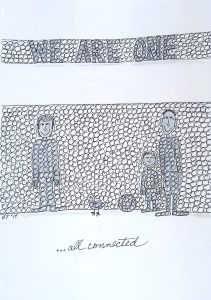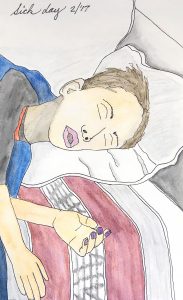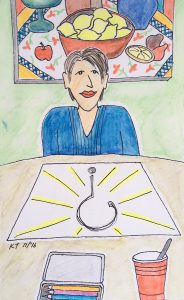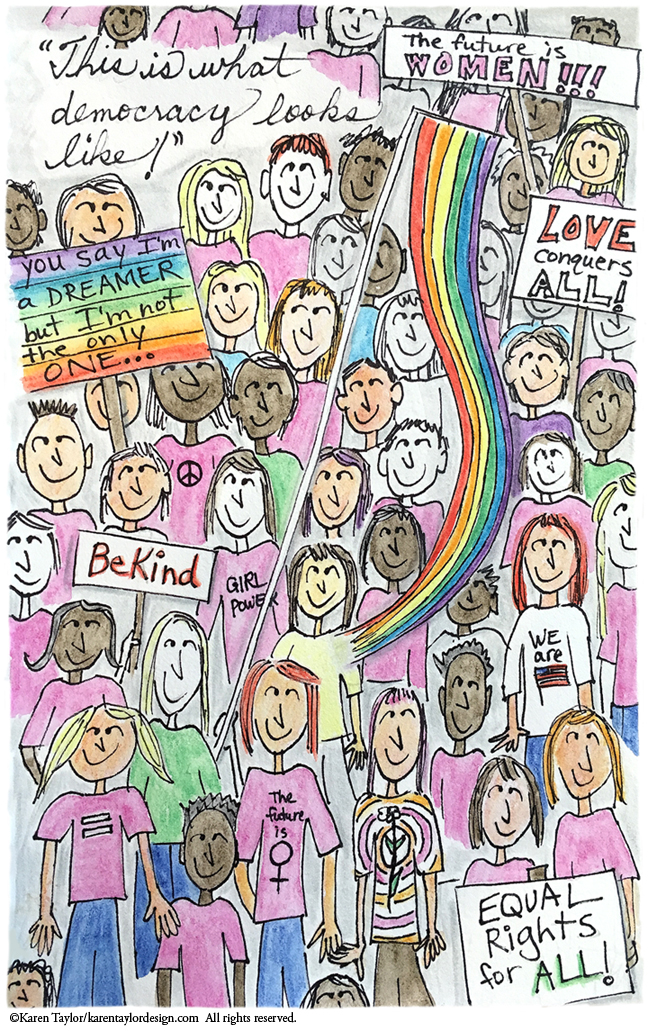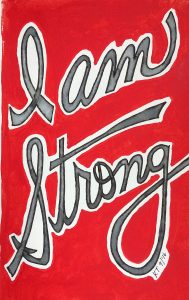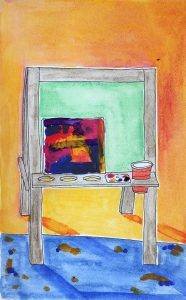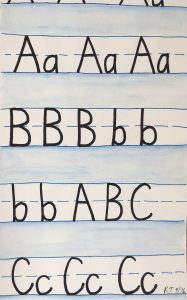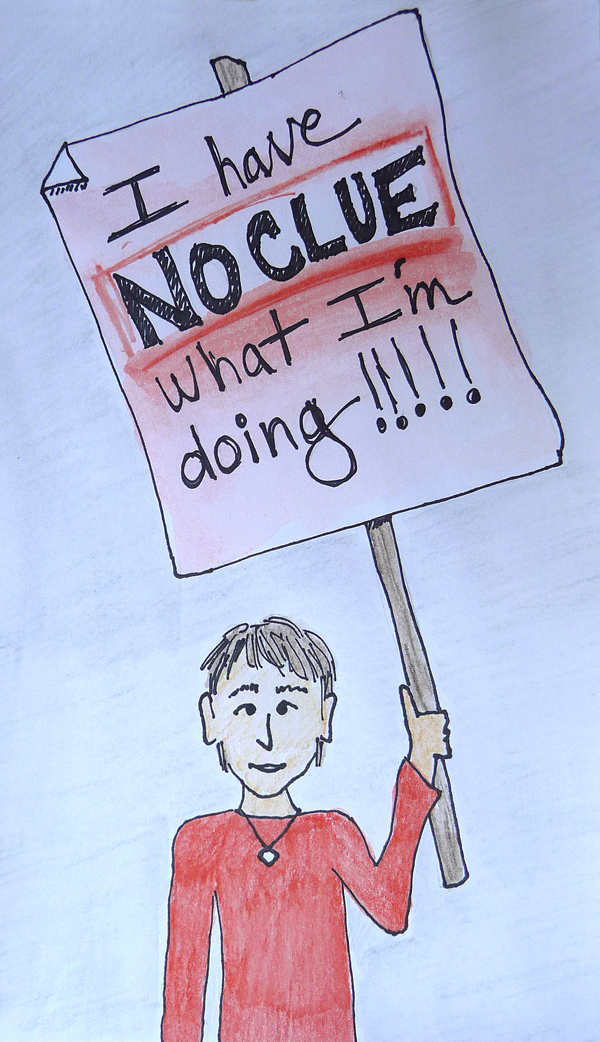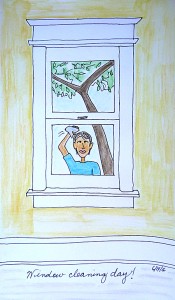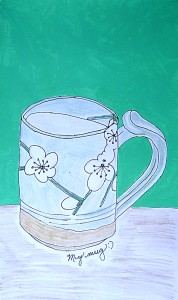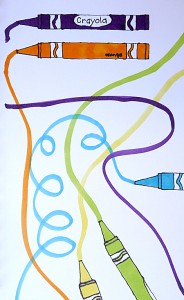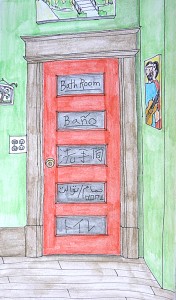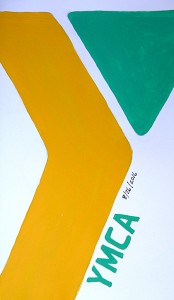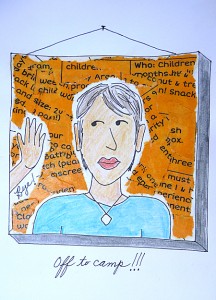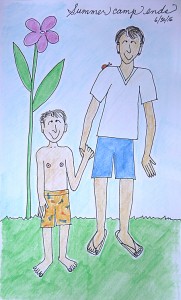Author: kroset

Sick day
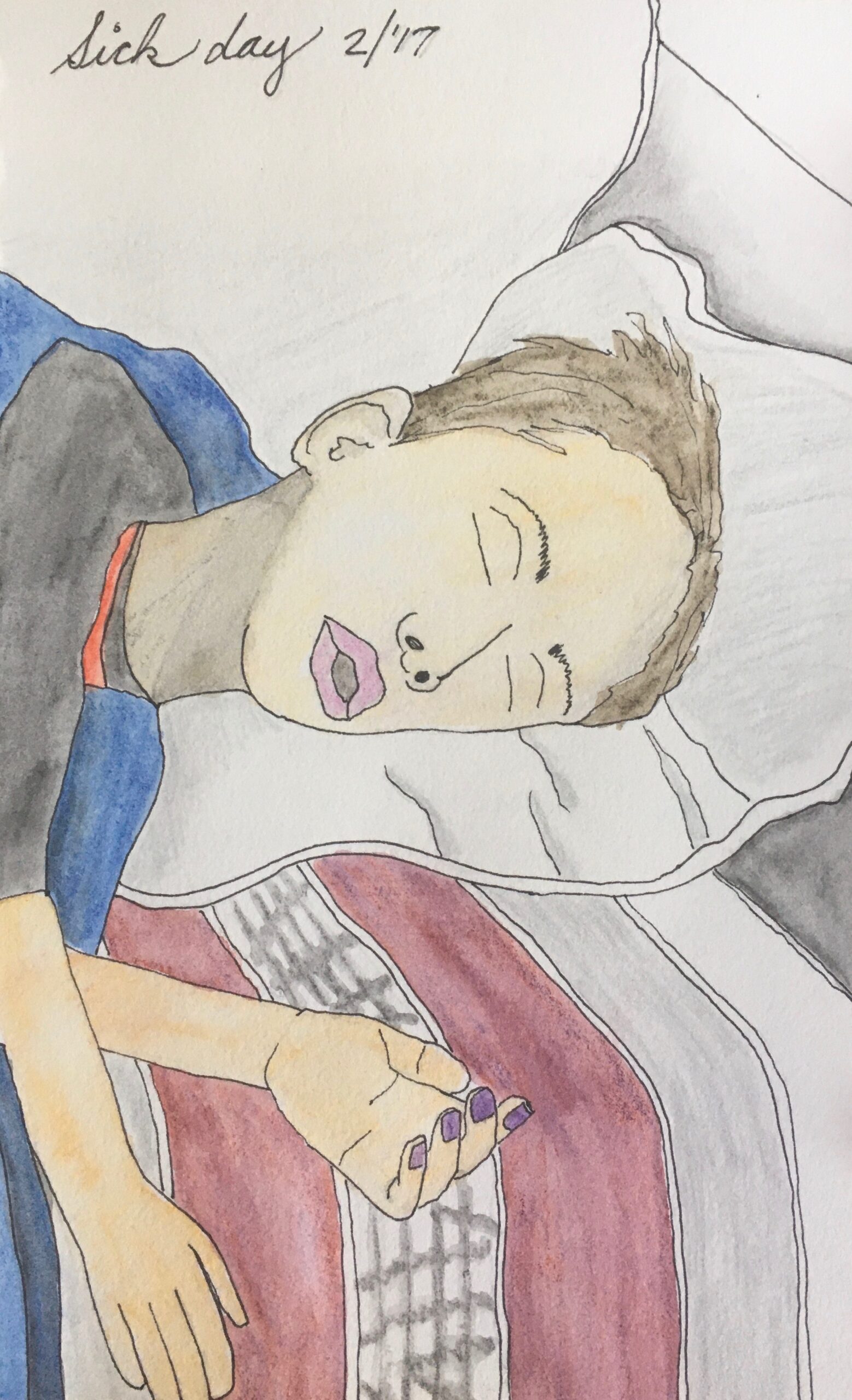
I hate seeing my little boy sick 🙁

Women’s March 2017
I was proud to participate in the Women’s March in San Jose this past Saturday. Although I was simply walking and not holding any specific sign I know that the main reasons I wanted to march was to be an inspiration to others to be kind to each other and to treat each other as equals regardless of race, religion, gender or even political party, and to stand up to those that treat people unkindly or unfairly. This drawing is a visual interpretation of MY take on the march.

Adoptive mother: The ‘Adoption’ card
My husband and I have always been aware that sooner or later along our journey of raising an adopted child, statements and questions would arise from our son or from others that would sometimes be painful, hurtful or throw us for a loop. Like ‘Wild’ cards in the game of UNO, these statements usually tend to occur at moments when we least expect them. The first one I remember being on the receiving end of was an offhand comment from my sweet niece who asked an innocent question about “who my son’s ‘real Mom’ was.” Being a relatively new Mom at the time, I remember her comment really stung, but at the same time I knew to keep things in perspective and that there was no hurt intended from the comment but it was simply a 8-year-old trying to understand adoption and wanting to know more about her cousin’s birthmother.
Tonight, another one of these zingers got thrown at both my husband and I unexpectedly by our 5-year-old son just after we told him that he wasn’t going to get a snack after dinner. (In the game of delaying going to bed, the ‘Wanting a Snack’ card has been his most recent one that he has been playing nightly.) We are used to the typical counters coming from our son like: “You’re terrible parents,” and “I hate you both,” and even (Scott’s favorite) “You’re the cry makers!” But tonight his response to our denial was a new one, spewed out in a moment of rage… “You’re not the adoptive parents I was supposed to have!”
Now this is never a statement adoptive parents want to hear and in the past something like this would have surely cut deep and brought on an avalanche of tears. However, tonight I must have had my protective coat of armour on or perhaps I’m just secure enough in motherhood now to know that he really didn’t mean what he said because to my surprise, my reaction after hearing this statement for the first time didn’t involve pain or tears, but rather it was one of amusement and admiration. I actually smiled to myself when he said it and thought, “Wow! The angles our son is now taking to try to gain the upper hand in our game is actually quite astonishing. He actually played the ‘Adoption’ card for the first time!”
We know it’s normal for other kids to say all kind of mean things to their parents when they don’t get what they want and our kid is no exception. Except for the fact that he really, REALLY wants control, so much so that we needed to get help from a therapist to help us outsmart him since traditional methods of gaining the upper hand were not working for us. So, thanks to our training on dealing with our son’s outbursts, neither my husband nor I had a reaction to his comment other than the standard, calmly delivered response of, “Well I’m sorry you feel that way buddy but you’re still not getting a snack after dinner,” that my husband expertly delivered. Our son may have played a powerful card but we have the advantage of experience under our belts so we have learned to handle some blows.
In talking with my husband later, we wondered whether our son really knew the powerful card he was playing or if he just threw it out there to see what would happen. We both believe he was just trying to use anything he could to rile us up as many kids do, and that being the newest card in his hand he was likely just testing it out on us. But the thing that neither one of us could deny, and it amazed us both, was that somehow at just 5-years-old our son instinctively knew that the ‘Adoption’ card was a valid one and that it was a powerful one to play.

Best Health Blog Contest – I need your vote!
I found out yesterday that my website was nominated for Healthline’s “Best Health Blog Contest!” (Note: This is separate from being voted one of the “Best Adoptive Mom Blogs” of 2016.) I am more than honored for this as someone had to submit the nomination and it wasn’t me! Thank you, thank you, thank you!
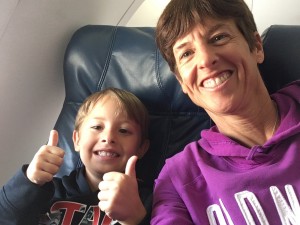
My vision in creating and maintaining this site has always been to educate the world about open adoptions and to clear up the many misconceptions and fears that open adoptions often bring.
If you’ve found value in my site and you wish to put your vote in to support me and my vision here’s how you can vote:
- Go to the Healthline “Best Health Blog Contest” page
- Scroll to the bottom of the page to use the search box to locate “Karen’s Calling”
- Enter your email address and click the “Vote” button. The screen will then turn gray – your VOTE HAS NOT BEEN COUNTED YET! You must scroll on that page until you find the “I’m not a robot” pop-up message somewhere on the page, and check the box.
- You will be returned to the voting page. Click “Send A Confirmation Email.”
- Follow the link in the email to approve your vote. This is important as VOTES ARE NOT COUNTED UNTIL THIS FINAL STEP IS COMPLETE.
Healthline allows everyone with a valid email address to repeat their vote every 24 hours so feel free to vote as many times as you’d like!
Thank you for your support!

Adoptive mother: The sister
“I want to meet my sister, and have deep dish pizza, and play in the snow.” These are the words we’ve been hearing from our five-year-old son recently.
“We can eat deep dish pizza here you know. And we could drive 4 hours to the mountains this winter to play in the snow,” we say, to which he replies, “No, we have to have deep dish pizza in Chicago” (apparently he saw a kids video about Chicago’s deep dish pizza,) “and when we go to Chicago we can play in the snow. There are tall buildings there – that’s what Mom says,” he says to his Dad. “And we can meet my sister when we are there.”
“We want these things too honey. We do,” we reply honestly. “We don’t know when we can meet her sweetie.” Inside we both wonder, does his sister even know he exists? Have her adoptive parents ever brought him up to her telling her that she has a brother? We have no clue. We know people have all different levels of comfort about what they want to share and what to not share with their own adoptive children. For us being as open and honest as possible about information that we know about his adoption is how we are choosing to raise our son. The people we surround ourselves with tend to share our viewpoints, or if they don’t agree with us at least they accept our choice as we do other people’s. As adoptive parents we knew that things would come up over time that would be complicated regarding our son’s adoption. Adoptions are messy and hard sometimes amongst the beauty and love that they contain.
The weird thing is that we hardly ever talked to our son about his sister in his five years of life. We introduced Catherine, his sister, to him when he was three by showing him a picture of her and briefly stating that she was adopted too, lived in Chicago and that she was his sister. (See “Introducing Catherine”) Since then we’ve only brought her up a handful of times, if that, just to remind him that he does indeed have a sister. So recently when he’s been expressing interest in meeting her it came as a surprise to us. Perhaps seeing all the kids with siblings at school has piqued his interest about his own sibling?
I believe the ‘not knowing’ aspect of this is the hardest part for me and for anyone that has faced any kind of adversity in their life especially for adoptive families who don’t know their child’s history or a birthparent who doesn’t hear a lot of information about their child. Because my husband and I are not in touch with the other adoptive family that is raising his sister, we have no answers for our son about her other than the little bits of information that has been shared with us over the years by his birthmother. We are very fortunate to be in touch with both my son’s birthparents. He knows them, has talked with them and has seen them several times. They are not at all missing pieces in my child’s life, which is beyond wonderful. The missing piece of the puzzle has always been our son’s older sister.
We had tried once to be in touch with Catherine’s adoptive parents years ago but for whatever reason (not known to us) it never happened. We dropped it, until now, when once again we are reaching out to them via our son’s birthmother. Perhaps this time they will be ready to connect with us? Or not? We don’t know.
Our hope is that eventually the two siblings (now ages 5 and 9) will form a relationship with each other. They can meet via Facetime or Skype or perhaps in person some day. How cool I envision that being for them! Our children are incredibly lucky to have a biological sibling when neither of our families alone could give them that.

Adoptive mother: Balancing structure and free play
I’m happy to report that my son has been in kindergarten now for 2 weeks and there have been no reports of behavioral issues from his teacher as of yet. In fact, my son seems to be a model student. (Knock on wood – I don’t want to jinx it!) I’m pleased with how my son has adjusted to school these first few weeks. It’s been a really big adjustment for the little guy going from having a lot of unstructured play time each day to a very structured and regimented day with a strict teacher. As sad as I am that my child’s copious amounts of free time are now gone I’m suspecting that the structure his teacher is providing in the classroom is actually really good for my son. Our son’s therapist hit the nail on the head when she predicted: “the stricter the teacher the better it will be for him.”
Looking back at my son’s preschool years and at this past summer I remember how often I was struggling with my son’s behavioral issues. I’ve recognized a lot of his behavioral problems seem to stem around free play or when he is bored, in contrast, during circle time with teachers and in a more structured camp setting he had little or no behavioral problems at all. To say that these play-based situations are the crux of his behavioral problems would not be a fair statement since there may be underlying issues going on in the sections of my son’s brain which deal with the fight or flight response, however, I will say that in my son’s case I think having the amount of free play he had didn’t help his situation. I am in no way suggesting that play-based environments are bad or that I shouldn’t be giving my son time to choose his own activities – far from it. I just think that for certain kids, like mine, more structure might have been beneficial for him. In hindsight my son appears to actually NEED more structure in his days and for now at least is thriving.
Regardless of whether children thrive more with play or structure (there are compelling arguments all over the internet for both sides) I believe all children need exposure to both of these things. Through free play children learn to work a lot of things out themselves without the help of intervening teachers or adults. On the flip side, structure helps kids learn to follow rules and learn about consequences which is absolutely necessary in life when living in any society. Kids need practice in both areas. My son is so much better on a playground now at 5-years-old than he was at 4-years-old. I credit his improvement for two reasons: 1) because he is developmentally one year older, and 2) because I took him to so many parks and he interacted with so many other children over this last year. He got better playing with other kids through much practice. How can anyone possibly learn to adapt when altercations come up if they don’t have adequate practicing time on a playground? The same can be said when dealing with structure at home or in a classroom. It takes practice and discipline to learn to cope within a strict environment.
A troubling issue that I see at my son’s elementary school is the need for a better balance of free play and structured time. Our son’s school, like many other schools, currently weighs more heavily on structure. I find the lack of recess for kindergarteners at my son’s school disturbing with a total of just 15 minutes daily in a 6 hour period. 15 minutes! Upon discovering our children’s lack of recess time, another Mom and I decided that after school we were going to take our boys to the school park after class so our kids could vent out some energy. After arriving at the playground we looked on at our two active boys playing and were pleased with ourselves…until we saw our kids immediately start with rough play, tackling each other, pulling at each other’s arms, pushing and shoving each other, basically doing what typical boys like to do where they need a lot of intervention from adults before someone gets hurt. The other Mom and I were horrified at their behavior and soon we had a realization: perhaps part of the reason why schools don’t give more recess time besides the push for more academics in schools is the lack of staff to oversee the kids at recess. We both looked at each other laughing as we both said almost simultaneously, “Maybe it’s a good thing that they aren’t getting recess during school!”
Despite our realization of this I think we both know in our hearts that this rough free play is actually really good for them even with their need for structure and we both showed up at the playground again the following day with our boys to watch them play again, thankfully with less altercations this time. I have no plans to eliminate this play time from my child’s schedule anytime soon. He gets his much needed structure time from his teacher at school and I’m most grateful for that, but from me he is going to get the gift of free play. He needs more practice, clearly, and I’m going to make sure he gets it. So play on my sweet boy, play on!
“Make Way for Play” is a good article on the pros of free play.
http://www.scholastic.com/parents/resources/article/creativity-play/make-way-play
Kathy Eugster writes a good article on providing structure for your child
http://www.kathyeugster.com/articles/article005.htm
Comparing the two preschool philosophies: Play-Based vs. Academic
http://www.pbs.org/parents/education/going-to-school/choosing/comparing-preschool-philosophies/



